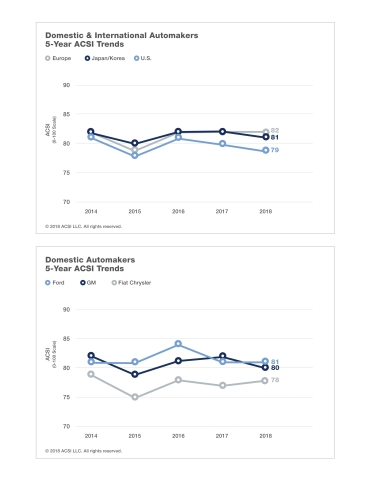ANN ARBOR, Mich.--(BUSINESS WIRE)--Customer satisfaction with automobiles and light vehicles rises 1.2 percent to a score of 82 on the American Customer Satisfaction Index’s (ACSI®) scale of 0 to 100, according to the 2018 ACSI Automobile Report. The top nameplates shuffle as Volvo ties Lexus for best luxury automaker while Subaru takes over the lead in the mass market.
European cars stand steady at a score of 82 for the highest owner satisfaction, trailed by Japanese and Korean automakers, which slip to 81. U.S. manufacturers place last at 79 after losing ground for the second consecutive year.
Among U.S. automakers, Ford holds steady at 81, overtaking first place after GM dips to 80. Fiat Chrysler improves to 78, but remains in third place.
While both product and service quality have improved for the industry overall, this year's rise in driver satisfaction is largely the result of better value.
“Car owners are often highly satisfied—they’ve kicked the tires enough times that they’re happy with their decision when they buy,” said David VanAmburg, Managing Director at ACSI. “But this year’s improvements might not last. Proposed tariffs on auto imports add to the pressure of rising metal costs for both international automakers and American-made cars using foreign parts. We’ll be watching how the threat of higher prices affects customer satisfaction in the coming year.”
Subaru takes the crown among mass-market vehicles
Subaru sheds 1 percent for an ACSI score of 84, good enough for first place after last year’s leader, Toyota, tumbles 3 percent to 83. That ties for second place with Honda, which improves 2 percent to 83.
Volkswagen is one of the most improved mass-market cars, gaining 4 percent for a score of 82. That follows a number of changes, including doubling the length of its warranties, investing in new technologies, and a fuel economy that drivers say is now among the best in the industry. The automaker’s success with consumers is driven largely by its SUVs, where it’s rapidly gaining market share.
Below that, eight companies tie at a below-average score of 80. Among these are MINI and Ram, both coming in with a score of 80. Buick, Jeep, and Nissan all hold steady compared to last year. GMC tumbles 5 percent for the largest drop in the group, while Hyundai falls 4 percent and Mazda dips 2 percent.
Kia slumps 4 percent to 79, joining Chevrolet (down 2 percent) and Mitsubishi (up 1 percent). Fiat rises 4 percent to 78, showing the most improvement along with Volkswagen, but remains near the bottom of the category. Dodge and Ford tie at 77 but move in opposite directions: Dodge gains 3 percent while Ford falls 3 percent. Chrysler drops 6 percent to a 74 for a distant last place.
Among mass-market cars, driving performance is up 1 percent to 86, and both vehicle safety and comfort are unchanged. Dependability, however, is down. Drivers give slightly lower marks for the look of exteriors (84), but interiors are unaffected (83). Gas mileage continues to be the low point at a score of 78.
Luxury vehicles have a new contender
Volvo is the big winner among luxury vehicles, gaining 4 percent for an ACSI score of 85, tying Lexus (down 1 percent) for first place. This is a new high for Volvo, the most improved luxury car of 2018. Volvo reportedly doubled its investment in U.S. operations to $1.1 billion last year, and it’s paying off in customer satisfaction as the nameplate ties Lexus for top marks in both vehicle safety and comfort.
Lincoln is the top-rated U.S. automaker, up 1 percent to 84. Audi gained 1 percent to 83. Following a raft of recalls, Mercedes-Benz retreats 2 percent to 82, evenly matched with Cadillac, which slips 1 percent, and BMW, unchanged. Acura rose 1 percent to 81, ahead of Infiniti, which returned to the bottom of the luxury category at 78.
Luxury car owners note several improvements in the customer experience. Driving performance is excellent, safety has improved, cars are more dependable than ever, and both interiors and exteriors continue to impress (all score an 87). Luxury vehicles also improved slightly in warranties (83) and gas mileage (78).
The ACSI Automobile Report 2018 is based on 4,649 customer surveys collected between August 11, 2017 and July 31, 2018. Download the full 2018 ACSI Automobile Report.
Follow the ACSI on LinkedIn and Twitter at @theACSI.
No advertising or other promotional use can be made of the data and information in this release without the express prior written consent of ACSI LLC.
About ACSI
The American Customer Satisfaction Index (ACSI®) has been a national economic indicator for almost 25 years. It measures and analyzes customer satisfaction with more than 380 companies in 46 industries and 10 economic sectors, including various services of federal and local government agencies. Reported on a scale of 0 to 100, ACSI scores are based on data from interviews with roughly 250,000 customers annually. For more information, visit www.theacsi.org.
ACSI and its logo are Registered Marks of the University of Michigan, licensed worldwide exclusively to American Customer Satisfaction Index LLC with the right to sublicense.




